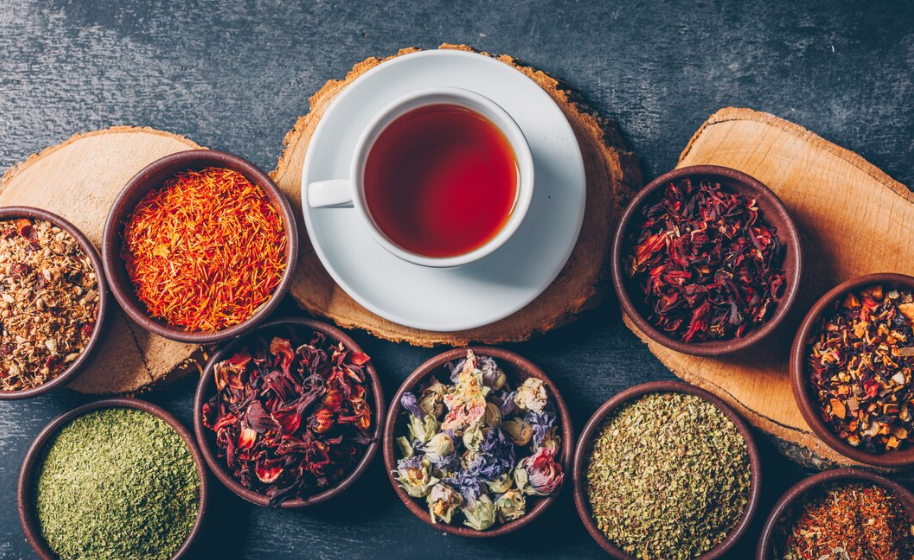Herbal teas have been enjoyed for centuries for their soothing properties and potential health benefits. In recent years, they’ve gained attention as a natural way to support blood sugar management, especially for individuals with prediabetes, type 2 diabetes, or those looking to maintain healthy glucose levels.
Teas like green tea, cinnamon tea, and hibiscus tea contain powerful compounds such as antioxidants and polyphenols that may improve insulin sensitivity, reduce glucose absorption, and promote overall metabolic health.
But how effective are these teas, and can they complement traditional treatments? In this article, we’ll explore the science-backed benefits of herbal teas for blood sugar control and how to incorporate them into your lifestyle for optimal health. Always consult your healthcare provider before making dietary changes.
How Herbal Teas May Help Regulate Blood Sugar
Herbal teas contain bioactive compounds such as polyphenols, flavonoids, and antioxidants that may positively impact blood sugar levels. These compounds work through various mechanisms:
- Improved Insulin Sensitivity: Certain herbal teas enhance the body’s response to insulin, helping cells absorb glucose more efficiently.
- Reduction in Glucose Absorption: Some teas slow down carbohydrate digestion and reduce glucose absorption in the intestines.
- Antioxidant Effects: By combating oxidative stress, herbal teas can reduce inflammation and support overall metabolic health.
Top Herbal Teas for Blood Sugar Management
1. Green Tea
- How It Helps: Rich in catechins, particularly epigallocatechin gallate (EGCG), green tea improves insulin sensitivity and lowers fasting glucose levels.
- Research: Studies have shown that regular green tea consumption can reduce HbA1c levels, a marker of long-term blood sugar control.
2. Cinnamon Tea
- How It Helps: Cinnamon is known for its ability to mimic insulin, enhance glucose uptake, and slow carbohydrate digestion.
- Research: Evidence suggests that cinnamon may lower fasting blood sugar and improve insulin sensitivity over time.
3. Ginger Tea
- How It Helps: Ginger contains compounds like gingerols and shogaols that improve glucose metabolism and reduce fasting blood sugar.
- Research: A review in Complementary Therapies in Medicine highlighted ginger’s role in lowering HbA1c levels.
4. Hibiscus Tea
- How It Helps: Hibiscus is rich in antioxidants that can help reduce inflammation, a common contributor to insulin resistance.
- Research: Studies suggest hibiscus tea may lower fasting glucose and improve lipid profiles, which are often linked to blood sugar health.
5. Fenugreek Tea
- How It Helps: Fenugreek seeds are high in soluble fiber, which slows digestion and reduces post-meal blood sugar spikes.
- Research: Fenugreek supplementation has been associated with lower fasting glucose and improved insulin sensitivity.
6. Chamomile Tea
- How It Helps: Chamomile’s anti-inflammatory properties support pancreatic health, which is vital for insulin production.
- Research: Some studies indicate chamomile tea may reduce HbA1c and fasting blood sugar levels.
How to Incorporate Herbal Teas for Blood Sugar Control
- Choose Unsweetened Options: Avoid adding sugar or sweeteners to maintain the blood sugar benefits.
- Drink Consistently: Regular consumption is key to reaping the benefits.
- Combine with a Healthy Lifestyle: Herbal teas work best when paired with a balanced diet, regular exercise, and adequate sleep.
- Monitor Blood Sugar Levels: If you have diabetes, monitor your glucose levels to track how herbal teas affect you.
Potential Risks and Considerations
- Drug Interactions: Some herbal teas, like green tea or fenugreek, may interact with diabetes medications or blood thinners. Consult your healthcare provider before adding herbal teas to your routine.
- Allergies: Ensure you’re not allergic to any ingredients in the teas you choose.
Conclusion
Herbal teas, such as green tea, cinnamon tea, and hibiscus tea, offer promising benefits for blood sugar management due to their bioactive compounds and antioxidant properties. While they are not a cure or a substitute for medical treatments, they can be a valuable addition to a comprehensive blood sugar control plan.
Pairing herbal teas with a healthy lifestyle and consulting a healthcare provider ensures safe and effective use. Enjoy the calming ritual of tea while supporting your journey to better health!
FAQs About Herbal Teas and Blood Sugar Management
1. Can herbal teas help lower blood sugar?
Yes, certain herbal teas, such as green tea, cinnamon tea, and fenugreek tea, contain compounds that can enhance insulin sensitivity, reduce glucose absorption, and support overall blood sugar management.
2. How often should I drink herbal tea to see benefits for blood sugar control?
Most studies suggest drinking 2–3 cups of herbal tea daily to experience potential benefits. However, consistency is key, so make herbal tea a regular part of your routine.
3. Can herbal teas replace diabetes medications?
No, herbal teas should not replace prescribed diabetes medications. They are best used as a complementary approach alongside medical treatments, a balanced diet, and exercise.
4. Are there risks associated with drinking herbal teas for blood sugar control?
Some herbal teas, like green tea or fenugreek tea, may interact with medications or cause mild side effects. Always consult your healthcare provider before adding new teas to your regimen.
5. Are all herbal teas effective for managing blood sugar?
Not all herbal teas have proven benefits for blood sugar control. Stick to teas like green tea, cinnamon tea, and ginger tea, which are backed by scientific research.
6. Can I sweeten my herbal tea?
It’s best to avoid sweetening herbal teas with sugar or artificial sweeteners, as these can counteract their blood sugar benefits. Opt for natural alternatives like stevia if needed.
